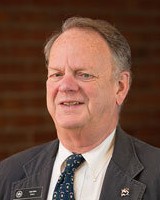
Robert Flint
Citation
Written by Fr. Michael Sweeney, OP, on May 2011 at the Induction in the College of Fellows
Robert Bryan Flint, husband and father, attorney, social activist, friend of families and of the poor, loyal son of the Church, the Dominican School of Philosophy and Theology salutes you.
In his Encyclical Letter Caritas in Veritate, Pope Benedict spoke of a love for others that is incarnate through institutions: “The more we strive to secure a common good corresponding to the real needs of our neighbors, the more effectively we love them. Every Christian is called to practice this charity, in a manner corresponding to his vocation and according to the degree of influence he wields in thepólis. This is the institutional path — we might also call it the political path — of charity, no less excellent and effective than the kind of charity which encounters the neighbor directly, outside the institutional mediation of thepolis” (Caritas in Veritate 7).
Since being admitted to the Alaska Bar Association forty-seven years ago, you have manifested a zeal for the common good and exemplified the institutional and political path of charity of which the Holy Father speaks.
Graduating in 1960 with a degree in economics from Yale University, you undertook the study of law at Georgetown University, completing your studies in 1963 and being admitted to the Alaska Bar in 1964. Your early practice of law was in the public sector, serving in the Attorney General's Office for the State of Alaska, the Anchorage District Attorney's Office and as Legislative Assistant to Alaska's Congressman in Washington, D.C. In your subsequent private practice you emphasized business law, municipal finance and adoption law, in which capacity you assisted in framing the Indian Child Welfare Act, conceived to “protect the best interests of Indian children and to promote the stability and security of Indian tribes and families.”
You have lived the conviction that the Church has an indispensable role to play in civil society, and have assisted the Archbishops of Anchorage in implementing the Church's social teaching. You were instrumental in founding the Brother Francis Shelter for homeless men and women, Clare House for mothers and children, and were a founding member of Covenant House in Anchorage. You founded and served as the Executive Director of the Catholic Foundation of Alaska and assisted in establishing the Alaska Catholic Conference, which you served as Executive Director. You have been an outspoken critic of what you perceive to be the overreaching of the judiciary in social issues, and have served as a consultant to the Governor of Alaska in articulating questions for the appointment of judges.
You have championed ecumenical initiatives in social justice, assisting in the foundation of the Alaska Family Council, an Evangelical initiative, for which you have served as a board member. You forged an alliance of Catholics and Evangelicals to campaign successfully for parental notification rights in Alaska, the first state in the Union to pass such legislation.
You have been a friend and collaborator to the Dominicans of the Western Province since we established a house in Anchorage in 1974. We are grateful that you have consented to further that collaboration as a Fellow of our School.
Therefore, as an expression of our esteem and gratitude, and in virtue of the authority invested in me by the Board of Trustees of the Dominican School of Philosophy and Theology, I am privileged to bestow upon you, Robert Bryan Flint, the degree of Doctor of Humane Letters honoris causa, and to name you as a Fellow of the School.
